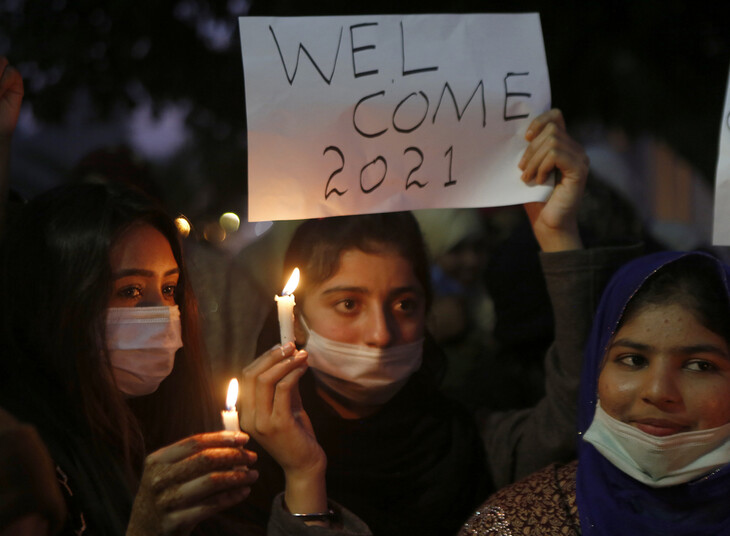Punjab State Supreme Court “No Human Rights Violation and No Need”
Banned several years ago in India and Bangladesh… 20 countries still in force

In Lahore, Punjab, Pakistan, women are holding a New Year’s ceremony with papers and candles that read’Welcome to 2021′. A court in Punjab ruled on the 4th that it was unconstitutional to test women victims of sexual violence for’virginity’. Lahore/AP Yonhap News
The court has put a brake on the investigation process in Pakistan to confirm the’virginity’ of women victims of sexual violence. The Supreme Court, which is the highest court in Punjab, Pakistan, judged the procedure as unconstitutional in a lawsuit filed by women activists on the 4th (local time) claiming that a prosecutor for sexual experience of rape victims violates human rights Reported days. This decision applies only to Punjab, the most populous of Pakistan’s four states, but it is expected to serve as a precedent for similar lawsuits in progress in Sindh. Judge Ayesha Malik, who was in charge of the case hearing, said, “Virgin test is a serious human rights violation and is being carried out in the name of a medical procedure in sexual assault cases even though there is no scientific or medical necessity,” he said. Try” he pointed out. The court judged the 2015 and 2020 guidelines for virginity testing as unconstitutional, and pointed out that the Punjab state and federal governments should set up an investigation procedure to protect victims of sexual violence in accordance with international standards. Women’s activists all expressed their welcome to the decision, and Federal Minister of Science and Technology Chodry Farwad also rated it as a “breakthrough decision.” In Pakistan, a local satellite news channel reported that the hymen is checked or the vaginal size is checked by placing a finger on the genitals to determine whether a woman who has reported sexual violence has experienced sexual violence in the past. Virginity testing has been conducted since colonial times in Southwest Asia, and according to the World Health Organization (WHO), it is still being implemented in at least 20 countries. In the case of India, this was banned in 2013, and in 2018, Bangladesh and Afghanistan also took measures. In Pakistan, women are less likely to report sexual violence when it is known about social stigma, and relatively few are convicted because of complicated investigation procedures and weak penalties. However, as a woman who had been in a car accident in Lahore, Punjab in September of last year was gang raped in front of her children, demands to strengthen the punishment of sexual violence are increasing. Shin Ki-seop, senior reporter [email protected]
